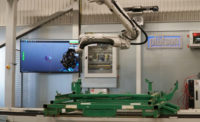Case study: How Automated SPC Helps One Manufacturer Consistently Improve

Quality data can help manufacturers to advance quality and streamline their operations – if they collect it properly. Instead of gathering plant floor data manually, which many large organizations still do, manufacturers can automate statistical process control (SPC) data collection and get a major leg up on possible quality issues.
Manual data collection increases the risk of errors. Humans make mistakes, and that means that valuable data can be typed in incorrectly or completely overlooked. When out-of-specification data is missed, manufacturers cannot immediately spot quality issues and prevent problems. Manual data collection also does not provide the long-term operational perspective that automated, insight-driven data collection can offer – knowledge about operational trends, which can ultimately drive continuous improvement.
Automated data collection can help quality professionals glean operational insights that lead to boosts in productivity and higher levels of customer satisfaction. Manufacturing companies that use automated data collection see benefits that range from improved product quality and compliance, reduced costs and risk, and the ability to make more strategic, data-driven business decisions.
For instance, one of Middleborough, Mass.-based Ocean Spray's plants began
using an automated data collection system in 2006 to visualize its manufacturing data. This quality team wanted access instead of paper-based records.
Due to the facility's success implementing automated data collection, the company's remaining food processing plants have also jumped onboard, using digital SPC to gain insights and boost quality.
In December 2018, Ocean Spray’s Markham, Wash. Plant had a process capability of 0.96 for a dried cranberries quality process. The following month, it was 1.46.
Prior to implementing SPC, operators at Ocean Spray’s food processing plants ran their operations on spec vs on target. They made individual adjustments to finished products at a cost to the company. In other words, the company spent additional money and used extra ingredients to achieve a desired quality level. With multiple plants producing the same products, achieving this consistency in both quality and consumer experience was expensive.
Once they made decisions with insights gleaned from SPC, the company manufactured products to target – not above. This ultimately saved the company money and still pleased clients.
Automated SPC ultimately helped Ocean Spray to see more clearly, and consistently into its sweetened dried cranberry manufacturing process. This insight made it easier to compare processes across plants and make immediate, significant fixes.
Collecting precise, consistent data became simpler, and that made it easier for Ocean Spray quality teams to create more streamlined and accurate reporting. At the end of every month, Ocean Spray seamlessly pulls data from its food plants, and can compare information just as smoothly.
In addition, its quality team spends much less time handling data, as all five of its plants now store information in the same format, in the same database, and using the same naming schemes.
With customer satisfaction and continuous improvement driving Ocean Spray Cranberries Inc.’s success, using automated SPC across its food and beverage manufacturing facilities has helped it remain a leader in its field.
Looking for a reprint of this article?
From high-res PDFs to custom plaques, order your copy today!









